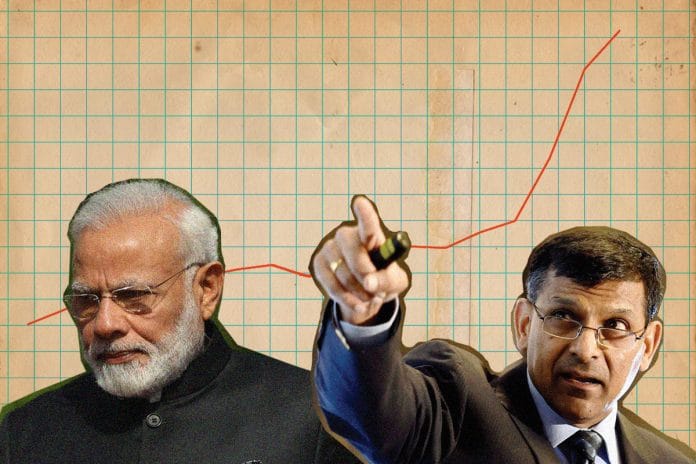Former RBI governor Raghuram Rajan in a note to a parliamentary panel said slow decision-making and over-optimism among bankers aggravated the bad loan problem. He also said a large number of these bad loans can be traced to the 2006-2008 period.
ThePrint asks– Raghuram Rajan NPA note: Congress legacy or Modi didn’t check bad loan crisis in time?
Utter idiocy to blame previous government for problems of today
 Praveen Jha
Praveen Jha
Professor, Centre for Economic Studies and Planning, Jawaharlal Nehru University
It is utter idiocy to blame the previous government for the problems of today. It is true that animal spirits were unleashed during the UPA’s time and we were indulging in excessive leveraging as if the sun would never set.
But any finger-pointing towards the previous government for what we are witnessing today is incorrect. In the last four years, the NPAs have risen from Rs 2 lakh crore to Rs 11 lakh crore. What explains that?
If the current government inherited something, what did it do to fix it? On the contrary, it made matters much worse. One could even argue that the current government is in cahoots with all these big players in black suits. One needs to question the proximity of these individuals and corporations to the government.
It is undeniable that there was a problem during the previous regime due to economic and political negligence. But the current government can’t absolve itself of the responsibility.
My analysis is that the problem began in 2012
 Ashvin Parekh
Ashvin Parekh
Managing partner, Ashvin Parkeh Advisory Services LLP
Raghuram Rajan’s note pointed towards a problem that is three-fold. First, the bankers were over optimistic. Second, the indecisiveness of the government at that time to act on policy related issues. Third, the role played by the global forces in escalating the bad loans problem.
My analysis is that the problem began in 2012 when there was some kind of expectation regarding economic revival, and it was assumed that a lot of capacity will have to be created in the economy. Ultimately, a problem of over-capacity came up. Corporates could not use this capacity, which led to an adverse situation.
The government at that time could not comprehend the generation of extra capacity in the economy. Policymaking was literally paralysed. I would blame the new government too for its inability to understand the banking nuances. Both the UPA and the Modi governments are to be blamed for this.
We haven’t been able to resolve the 2G scam or the coal scam till date. No decisions have been made regarding the energy distribution companies. While there is a lot of political vendetta, there is little ground work in making headway.
Almost three years were wasted on demonetisation and implementation of GST, instead of fixing these systemic policy related problems.
Also read: To address bad loans, govt asks RBI to identify public sector banks that can be merged
Banks were told to lend long-term capital to infra firms under Vajpayee govt
 Pronab Sen
Pronab Sen
Former principal economic adviser, Planning Commission
This is not just a Congress legacy. It began much earlier in 1997 when the government at that time decided to stop providing tax-free bonds to development finance institutions like the IDBI, the ICICI, and the IFCI, among others.
The net result was that these companies, which used to provide all the long-term loans, had to turn into commercial banks. All of a sudden you had a situation where other than commercial banks there was no source of long-term finance.
And, this was the beginning of the problem because Indian commercial banks were then forced to do the kind of lending which they were not designed to do.
They don’t have the appraisal capacity, nor do they have the project monitoring capacity. But they were forced to do it.
This became particularly bad when the infrastructure push started under the Vajpayee government and banks were asked to lend long-term capital to infrastructure companies.
It became worse during the UPA era because UPA started pushing public-private partnership in infrastructure, which meant that these infrastructure companies had to raise more funds than they used to earlier.
So, this huge exposure to infrastructure originated from the Vajpayee era and escalated during the UPA era.
All the loans that have turned into NPAs are long-term loans. The Indian banks were designed to provide short-term loans (working capital), not long-term ones.
Forcing the banks to do something that they were not designed to do is at the root of the problem. The Modi government hasn’t corrected anything, but allowed the situation to persist.
Sheer size of NPAs proves the problem started during previous govt’s tenure
 Nirupama Soundararajan
Nirupama Soundararajan
Senior Fellow & Head of Research, Pahle India foundation
The mounting NPA crisis in the banking sector is of a proportion that India has never witnessed before. The sheer size of the NPAs is testament enough to prove that the problem had its origins during the tenure of the previous government.
We must remember that it is not the retail loans but the corporate loans that have predominantly caused the problem. The RBI’s Financial Stability Report of June points in this direction too. The report also says that the condition is likely to worsen by March 2019.
That advances to large borrowers have slowed down is indicative of a cautious approach that banks have begun to adopt. This can be viewed as too late, too little or as never too late, and both phrases apply equally.
That banks are to be blamed for this mess is obvious. However, the buck does not stop there. It extends all the way to the government, both past and incumbent, and to the RBI. While the RBI must accept some part of the responsibility, the governments must accept theirs.
Numerous reports, including the recent P.J. Nayak Committee Report, have constantly highlighted the problem of governance and interference in credit decisions, and yet little has been done to correct this.
The NPA problem is singularly on account of bad lending by banks, possibly egged on by governments in the interest of infrastructure development, poor governance of bank boards, and rather laid back monitoring by the RBI. It is, however, time to stop playing the ‘who-started-it’ game and move on to ‘who-solves-it’.
Modi government is making the same mistakes as the UPA regime
 Mahua Venkatesh
Mahua Venkatesh
Associate editor, The Print
India’s gross non-performing asset level in March 2013 was less than 3.5 per cent. Today, it is in double digits. The NPA level has been steadily rising since 2014.
Former RBI governor Raghuram Rajan must be credited for identifying the problem and asking banks to undertake asset quality review (AQR) and disclose their NPA levels. He did not mince words on the crisis, and underlined the need to be tough on wilful defaulters to ensure that the problem does not recur.
It is true that public sector banks and their staff were under tremendous pressure between 2006 and 2010 to increase lending. So much so that expansion of credit portfolio determined performance of banks and their chiefs. In such circumstances, bankers did sanction loans in a reckless manner.
The BJP-led NDA government, which took over in 2014, has undertaken several measures, including putting in place the Insolvency and Bankruptcy Code, to address the issue. Its former chief economic adviser Arvind Subramanian prescribed the 4Rs – recognition, recapitalisation, resolution and reform – to address the problem. Prime Minister Narendra Modi also promised full autonomy to the banks.
But somewhere down the line, this government too is committing the same mistakes, like nudging the banks to increase their credit under the Pradhan Mantri Mudra Yojana (PMMY).
To say that these are small-ticket loans is a lame excuse. In a span of three years, the NPA level in this portfolio has risen considerably. In fact, Rajan has warned that the next NPA crisis could emerge from the loan portfolio pertaining to the micro, small and medium enterprises.
Let’s also not forget that during the demonetisation exercise – for almost six months – bankers grappled with other problems and addressing the NPA crisis took a back seat.
Compiled by Fatima Khan, jornalist at ThePrint. You can follow her on twitter @khanthefatima.







Prof PK Sharma, Freelance Journalist, Barnala (Punjab)
Three cheers for RSS and BJP not the INDIA’s DEMOCRACY !
RSS, BJP and NDA parties sharing power in the Union Government must own the blame and responsibility for shattering the economy of the nation !
Ironically,neither RSS nor BJP could rein in the whimsical, impulsive , megalomaniac, authoritarian, subjective, visionless and idiotic tendencies of those at the helm of affairs in time !
The economy of the nation did not go haywire either abruptly or all of a sudden ! Those at the steering deliberately overlooked warnings turning a deaf ear to the timely sounds of caution of the deteriorating plight of Indian Economy especially NPA !
Prime Minister Narendra Modi and Union Finance Minister Arun Jaitley must show moral courage to admit failures and serious
lapses resulting in the sad and bad state of Indian Economy ! They are indeed responsible for playing havoc with the economy of
the country !
They should have risen above petty personal ambitions, complacency and superiority complexes in the best interests of the nation !
The powerful duo of NaMo-Amit Shah owe an explanation to the nation as Executive Head and Bharatiya Janata Party Head why
they did not pay any heed to the warnings and sounds of caution regarding dismal condition of nation’s economy and NPA given by
Dr. Raghuram Rajan, Mr.Arvind Subramanian and Mr.Arvind Pangariya and many economic advisers and experts of India !
If Dr.Murli Manohar Joshi could request Dr.Raghuram Rajan to offer his expert opinion, inputs and feedback to arrest the menace
of NPA in the best interests of India what were NaMo and Arun Jaitley doing in this direction?
Sans any doubt, Mr.Amit Shah was busy expanding BJP numbers to enable it to be the largest party of the workd but both Prime Minister Modi and Arun Jaitley cannot escape the stigma and blot of ruining the economy of the nation !
There is one more vital drawback and lapse on the part of NaMo and Amit Shah that is- not adopting and pursuing consensus and democratic approach on vital issues of national significance ! It cannot be expected of them to seek Dr.Manmohan Singh’s expert opinion on economy when they can afford to ignore Dr. Murli Manohar Joshi, Mr.Yashwant Sinha,Mr.Arun Shourie and even Mr.Lal Krishan Advani known experts of their own party !
Amazingly, they did not deem it fit to knock at the doors of Mr.Advani and Dr.Joshi- two esteemed members of BJP Margdarshak Mandal to take some tips from them to curb NPA problem !
The nation will never forgive NaMo, Amit Shah, Arun Jaitley, RSS, BJP for the poor state of India’s economy,
ill-conceived/ill-planned/ill-executed decisions of Demonetisation,GST, foreign policy/ defence of the nation in tatters, farmers distress, ever mounting unepmployment, poverty , insurgency-transborder terrorism and communal violence !
The nation is in a state of chaos, mess and uncertainty because of erosion of credibility, confidence, values and morality !
Prof PK Sharma, Freelance Journalist
Pom Anm Nest,Barnala(Punjab)